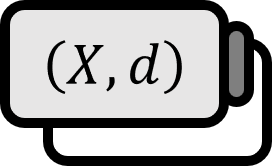Generalized Cantor's Intersection Theorem in Metric Spaces
Theorem 1
Let’s assume that $(X,d)$ is a metric space. $K_{n}\subset X (n=1,2,\cdots)$ is a non-empty compact subset. In this case, if $\left\{ K_{n} \right\}$
$$ K_{n}\supset K_{n+1}\ (n=1,2,\cdots) $$
is satisfied, then $\bigcap _{i=1}^{\infty} K_{n} \ne \varnothing$ is true.
If we set $\left\{ K_{n} \right\}$ as above, it has the finite intersection property, and therefore it immediately applies as a corollary of the theorem shown below. When set to $K_{n}=I_{n}=[a_{n},b_{n}]$, it becomes the Cantor’s intersection theorem in $\mathbb{R}$.
Definition
Suppose an arbitrary collection $\left\{ A_{\alpha} \right\}_{\alpha \in I}$ is given. If for all finite subsets $I$ of $J\subset I$ the following condition is satisfied, then $\left\{A_{\alpha}\right\}$ is said to have the finite intersection property.
$$ \bigcap \limits_{\alpha \in J} A_{\alpha} \ne \varnothing \quad \forall J\subset I, (J\ \mathrm{is\ finite\ set}) $$
In simpler terms, a collection $\left\{ A_{\alpha} \right\}$ has the finite intersection property if, by selecting any number of sets within the collection and taking their intersection, it never results in an empty set.
Theorem 2
Let’s assume that $(X,d)$ is a metric space. And let’s also assume a collection of compact subsets $K_{\alpha}\subset X$ have the finite intersection property. Then, the intersection over the entire collection is not an empty set.
$$ \bigcap_{\alpha} K_{\alpha} \ne \varnothing $$
Proof
We will prove this by contradiction.
Assume that $\bigcap_{\alpha}K_{\alpha}=\varnothing$. Then, choose arbitrarily one member of the collection and call it $K_{1}$. If we set $F_{\alpha}=(K_{\alpha})^{c}$ as, since in a metric space compact sets are closed sets, the complement of a closed set $F_{\alpha}$ is an open set. Further, by De Morgan’s laws
$$ K_{1} \subset X =\varnothing^{c}=\left( \bigcap_{\alpha} K_{\alpha} \right)^{c}=\bigcup_{\alpha}F_{\alpha} $$
Therefore, $\left\{ F_{\alpha} \right\}$ is an open cover of $K_{1}$. Since $K_{1}$ is compact, there exists a finite subcover of $\left\{ F_{\alpha} \right\}$ that covers $K_{1}$.
$$ K_{1} \subset F_{\alpha_{1}}\cup \cdots \cup F_{\alpha_{n}} $$
Since we set $F_{\alpha}=(K_{\alpha})^{c}$ above, the following holds.
$$ K_{1}\cap K_{\alpha_{1}}\cap \cdots \cap K_{\alpha_{n}}=\varnothing $$
However, this contradicts the fact that $\left\{ K_{\alpha} \right\}$ has the finite intersection property. Therefore, by contradiction, the following holds.
$$ \bigcap_{\alpha} K_{\alpha} \ne \varnothing $$
■
